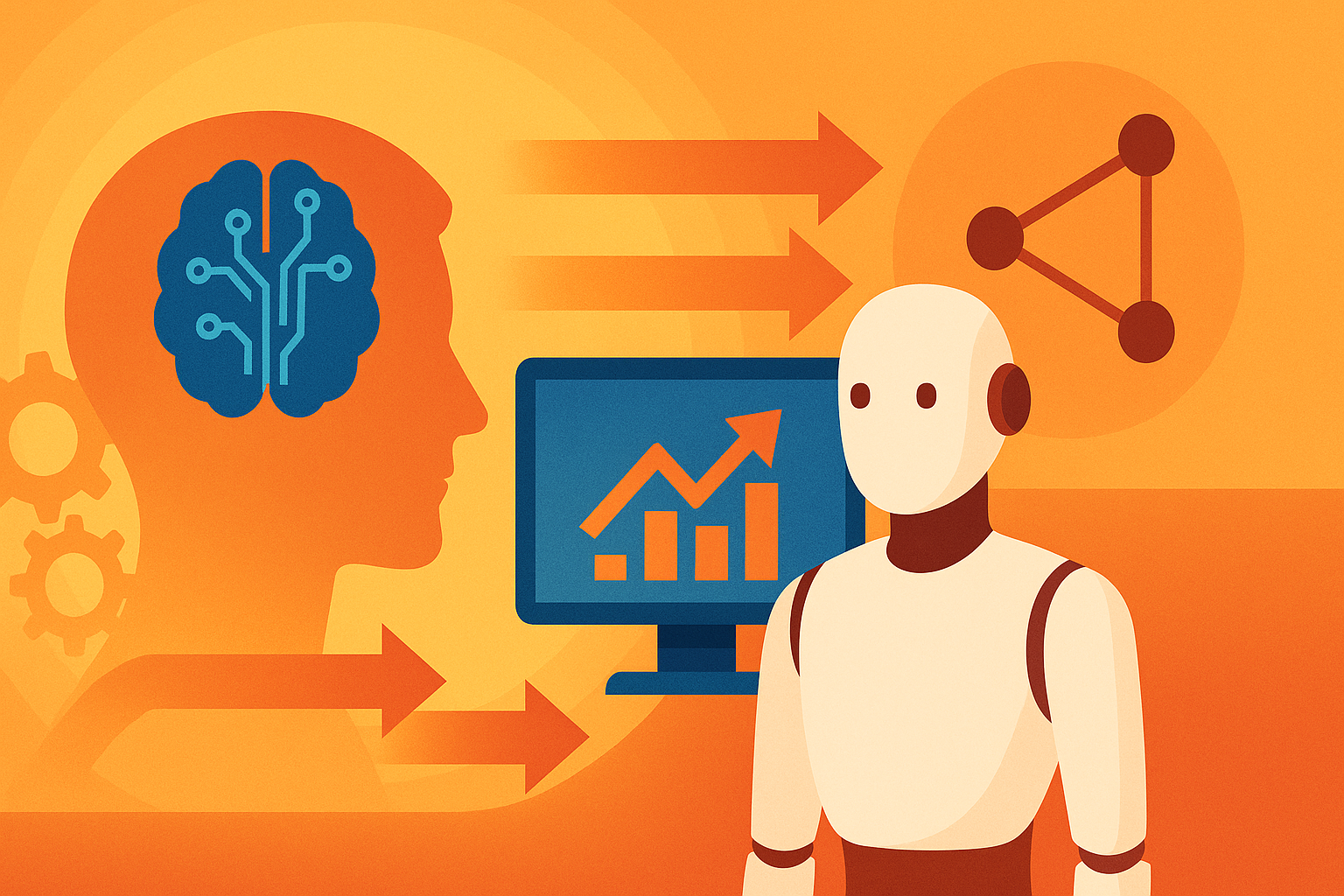From Automation to Agents - Leveraging Agentic AI for Smarter Enterprise Decisions
Discover how agentic AI is transforming enterprise decision-making. Learn how autonomous systems are boosting productivity, scalability, and customer experiences across industries in 2025.
Saloni Singh | 2 Jul 2025 | Max Read Time: 4 mins

Introduction: Beyond Bots—Why Agentic AI is the Next Big Leap
Traditional automation brought immense gains in productivity, but it operates on fixed rules, unable to respond to change or uncertainty. Now, as business environments become more dynamic and data-heavy, enterprises are turning to agentic AI.
Agentic AI doesn’t just automate tasks—it perceives, decides, and acts. It senses its environment, learns continuously, and adapts to achieve specific goals. This blog explores what agentic AI is, how it differs from traditional automation, and why it's becoming crucial for enterprise-scale decision-making.
Understanding Agentic AI
Agentic AI refers to systems that exhibit agency—the capacity to sense, interpret, and act independently toward defined objectives.
Key Features:
- Autonomy: Operates without constant human supervision
- Adaptability: Learns from new data and modifies behaviour accordingly
- Goal-Oriented: Focuses on achieving outcomes, not just executing instructions
- Interactive: Engages with users and systems to collect information and deliver solutions
In short, it’s AI that thinks and responds in real time, not just follows instructions.
Why Traditional Automation Falls Short
Legacy automation systems follow pre-defined workflows and rules. While efficient for repetitive tasks, they falter in complex, fast-changing environments.
Limitations of Traditional Automation:
- Inflexibility in handling exceptions or unstructured data
- Inability to learn or improve over time
- Requires constant human intervention for edge cases
As markets become more volatile and customer expectations evolve, automation needs to move from rigid scripting to context-aware intelligence.
How Agentic AI Transforms Enterprise Decision-Making
Agentic AI unlocks new capabilities for decision-making and operational agility:
1. Operational Efficiency
Autonomous AI agents can manage complex workflows—such as adjusting inventory or re-routing logistics—based on real-time forecasts and market signals.
2. Enhanced Customer Experience
AI agents learn from user behaviour to deliver personalised responses, escalate critical issues, and continuously refine support quality.
3. Data-Driven Strategy
Agentic AI identifies trends across massive datasets—helping leadership teams anticipate change and act preemptively.
4. Scalability Without Resource Load
AI agents handle growing workloads without proportional increases in manpower, making scaling more sustainable.
Real-World Use Cases of Agentic AI
Agentic AI is already being adopted across industries:
Finance
- AI agents detect fraud, assess credit risk, and offer personalised banking advice
- Improves compliance and customer satisfaction simultaneously
Healthcare
- Assists in diagnostics, patient monitoring, and appointment management
- Enhances care quality while reducing administrative burdens
Retail
- Optimises inventory personalises marketing, and improves customer engagement
- Learns from real-time purchase behaviour and adjusts in-session recommendations
Manufacturing
- Enables predictive maintenance, quality assurance, and supply chain optimisation
- Reduces downtime and improves throughput
Key Considerations for Implementation
To successfully adopt agentic AI, enterprises should focus on:
- Data Infrastructure: Ensure quality, secure, and structured data pipelines
- Skilled Talent: Hire or upskill teams in AI, data science, and prompt engineering
- Ethical Governance: Develop policies for transparency, accountability, and bias mitigation
- Continuous Monitoring: Regularly audit AI outputs and adjust models as business needs evolve
FAQs
What is agentic AI in simple terms?
Agentic AI refers to AI systems that can make independent decisions, learn from experience, and act toward specific goals, much like a digital agent with its own intelligence.
How is agentic AI different from traditional automation?
Unlike automation, which follows static rules, agentic AI adapts to new data, makes context-based decisions, and evolves over time.
Is agentic AI only for large enterprises?
No. While large enterprises may adopt it first, mid-sized companies can begin with focused use cases like customer service or predictive analytics.
What are the risks associated with agentic AI?
Potential risks include a lack of transparency, bias in data, or over-reliance without human oversight. That’s why governance, monitoring, and ethical design are critical.
How can a company start with agentic AI?
Begin with a high-impact pilot project, such as an intelligent assistant or autonomous decision engine in a single function (e.g., customer support or demand planning).
Conclusion
The evolution from traditional automation to agentic AI marks a pivotal shift in enterprise capability. Businesses that adopt agentic systems can make faster, smarter decisions, streamline operations, and enhance customer value, without a proportional increase in cost or effort.
As competitive pressures grow, agentic AI won’t just be a differentiator—it will be an essential infrastructure for the agile, intelligent enterprise.
The next phase of business intelligence isn’t just about data—it’s about agents that act. Now is the time to build them.